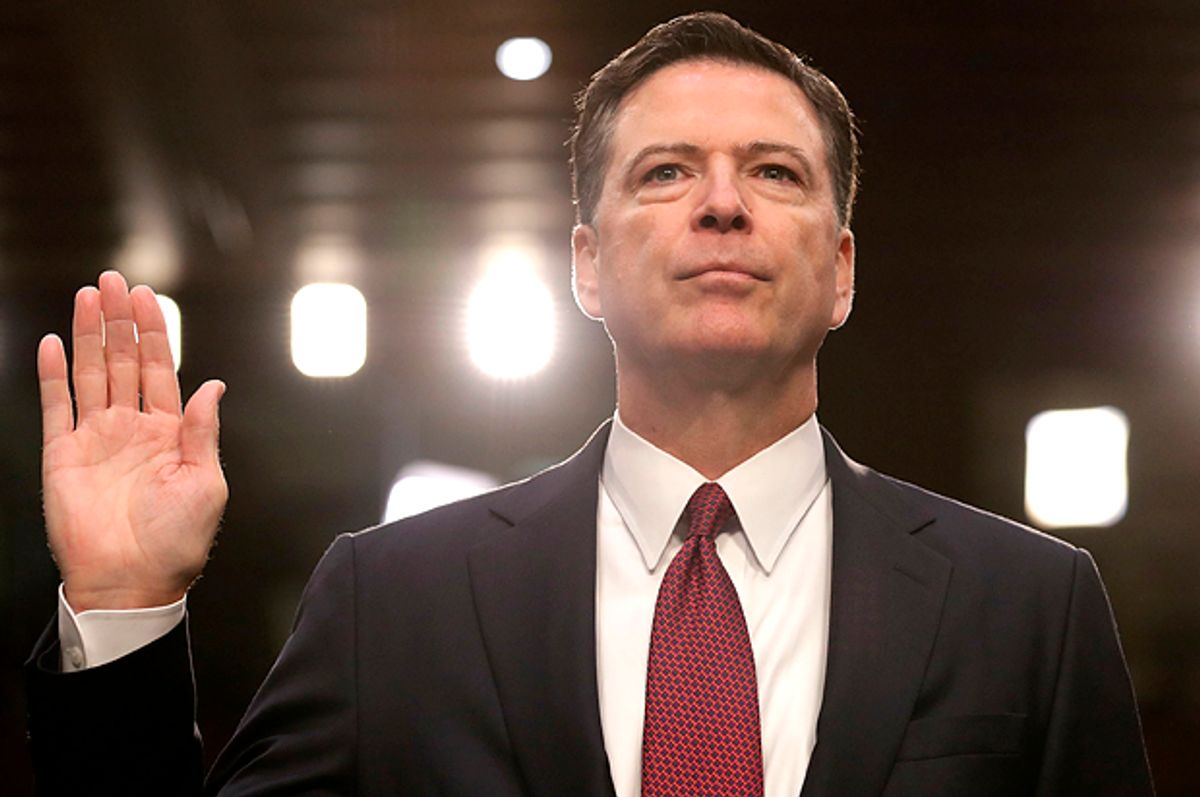During his Thursday testimony in front of the Senate intelligence committee, fired FBI Director James Comey provided what seemed like a year's worth of news in one three-hour hearing.
Here is a list of revelations that came out of Comey's public testimony:
1. Quid pro quo
One of the most damning allegations the fired FBI director made during Thursday's hearing was that President Donald Trump sought a pledge of loyalty shortly after he was inaugurated.
Comey said that he found this request odd beyond the fact that the FBI is supposed to be independent of the White House. Comey explained that on multiple occasions Trump had assured the former FBI director that his job was not in jeopardy. Comey suspected that the president only after realized that he got nothing in return from this stamp of approval, so he later attempted to make Comey indebted to him.
2. Steele dossier
Comey expressed no desire on Thursday to discuss the contents or the veracity of the infamous Steele dossier. When asked by Sen. Richard Burr if the FBI had confirmed any criminal allegations from the dossier, Comey said that he could not answer that question in an open setting, suggesting there may be classified information that exists that points to credible allegations.
3. Tapes
The former FBI director acknowledged in his hearing Thursday that a lot of his testimony would be open to he-said-she-said scrutiny. Comey indicated that he was hopeful there were surreptitious records of his conversations with the president, as Trump has claimed on Twitter, so that there would be reliable documentation on their exchanges.
"Lordy, I hope there are tapes," he testified, encouraging the president to “release the tapes.”
4. Comey leaked his memos
While most of the facts in Comey's oral statements on Thursday came out the day prior when the Senate intelligence committee published his written testimony, one interesting, new tidbit to come out of Thursday's hearing was that Comey had shared memos about his interactions with Trump to a law professor friend who later leaked them to the press.
Comey justified this decision in part because he hoped his memos would precipitate the appointment of a special prosecutor to take over the FBI investigation into the Trump campaign.
Sen. Chuck Schumer's communications director noted that Comey did not call for a special counsel in the Hillary Clinton email probe because he did not want to imply that there was something there — Comey did not offer the same generosity to Trump.
5. Meddlesome priest
Sen. Angus King, the Independent from Maine, made headlines on Wednesday for his stern questioning of intelligence officials who refused to answer questions about Trump's possible obstruction of justice. King was part of another highlight on Thursday when he and Comey both compared the former FBI director's situation to Thomas Becket, the Archbishop of Canterbury who was killed at the request of King Henry II in the year 1170.
6. Collusion? Still no answer
Sen. Tom Cotton asked Comey point blankly during the hearing whether he believed Trump obstructed justice by asking him to back down on an investigation of a White House official.
Comey replied that it would be inappropriate for him to answer that question in an open setting.
7. Kamala Harris lays the groundwork
Democrats on Thursday curiously dedicated a lot of their time to Attorney General Jeff Sessions, who was forced to recuse himself from the Russia investigation because of undisclosed contacts with Kremlin officials.
Comey revealed in his oral testimony on Thursday that there was classified, undisclosed information that suggested Sessions would have had to recuse himself from the investigation even if he had not committed the blunder of lying to the Senate judiciary committee during his confirmation hearing in January.
Harris' line of questioning on Thursday strongly suggested that the California senator had some insight into potential wrongdoing on the part of Sessions. Harris asked a ton of questions — many related to Sessions — that Comey refused to answer in a public setting. Observers of Comey's hearing suspected that Harris was indirectly informing the public of concerns her committee has with the acting attorney general.
8. McCain becomes confused
To end the hearing, Sen. John McCain, usually a lucid voice on military and intelligence matters, asked Comey a bizarre line of questions, which, at first, seemed to conflate Clinton's FBI investigation with the active probe into the Trump campaign.
Unfortunately for Democrats, McCain's office divulged after the hearing that the Arizona senator was trying to help their case. A statement from McCain clarified that he was trying to get Comey to offer his personal opinion on the issue of Trump obstructing justice on the basis that the former FBI director had done so in the case of Clinton.



Shares